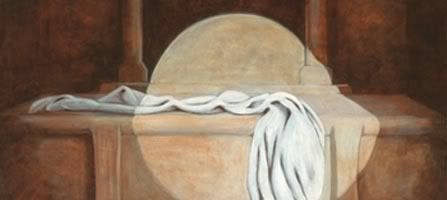
MARK 16 (NLT)
The Resurrection
1 Saturday evening, when the Sabbath ended, Mary Magdalene, Mary the mother of James, and Salome went out and purchased burial spices so they could anoint Jesus’ body. 2 Very early on Sunday morning, just at sunrise, they went to the tomb. 3 On the way they were asking each other, “Who will roll away the stone for us from the entrance to the tomb?” 4 But as they arrived, they looked up and saw that the stone, which was very large, had already been rolled aside.
5 When they entered the tomb, they saw a young man clothed in a white robe sitting on the right side. The women were shocked, 6 but the angel said, “Don’t be alarmed. You are looking for Jesus of Nazareth, who was crucified. He isn’t here! He is risen from the dead! Look, this is where they laid his body. 7 Now go and tell his disciples, including Peter, that Jesus is going ahead of you to Galilee. You will see him there, just as he told you before he died.”
The last couple of days, I have felt as though God has been attempting to convict me of the need to re-prioritize my relationship with him. The latest challenge came from today's Sunday sermon. After all, what better time to have one's attention drawn back to God than a weekend devoted to Jesus' death and resurrection?
Service began with a sharing by one of my former Sunday-school teachers about the passing of her mother due to illness. While the occasion was difficult, she praised that her mother was now no longer suffering and that she would see her mom again one day in paradise. But moreover, she extolled the congregation for their stalwart support of her and their unwavering prayers for her mother during the difficult period prior to her mother's death. She had truly felt taken care of, she said.
As she concluded these words, a flutter of doubt crept in through the back door of my heart. Having recently mourned the passing of my own aunt, I wondered why our active and compassionate God did not simply heal those for whom so many were praying.
Perhaps, Satan tempted,
God did not exist at all, as so many today would assert.
Of course, it is not by our will that a person lives or dies, but God's own will. Yet couldn't God make his hand more obvious? His authority would be easier to accept if it were more plainly laid before us. Such lures occasionally find their way into my mind, and while they do not ultimately sway my constitution, they can momentarily thrust my heart into confusion.
...
"In my experience, there's no such thing as luck." Obi-wan KenobiAs if responding to my challenge, God began to weave together the tapestry he had been carefully threading through my life. The first threads had been sewn through my course visits to Alcoholics Anonymous. These visits had prompted many personal spiritual examinations.
This organization recognized the power of the Church structure and of fellowship. They proclaimed the importance of the "grace of God" and humility, and yet they neatly ducked around the actual person of God in whom they had placed their trust. Instead, they endorsed the "God of their own understanding" - be it the AA group itself or a mysterious "energy force" of which we are all a part. So close, yet so far.
At the same time, AA had capitalized on a powerful aspect of fellowship through "sponsorship" of new members, pairing a mentor and a seeker at all times. They kept sober by sharing what they had learned, and they received sobriety by learning from others. Perhaps, in all its similarities, the Church would benefit from such accountability and generosity, I thought.
...
It was talking to my brother about the lull in my spiritual development that the answer arrived. It was unexpected and unrecognized at the time.
Everybody needs a Paul, and everybody needs a Timothy, he said.
Paul is the spiritual mentor, the one from whom we can seek advice and learning. Timothy is the spiritual receiver, the one with whom we can share and encourage. Christian growth, he argued, requires both. A Paul and a Timothy. Sponsorship is not a novel invention by Alcoholics Anonymous, it is a formalized type of discipleship, co-opted for secular purposes. Christ had prompted us to share that which we had received from the very beginning, though we often are too reserved to do so. Thus, this aspect of the AA method
also seems to borrow from the Church, as Christians have been discipling one another since the apostles themselves.
...
Insurmountable obstacles: our pastor arrived at this point in his Sunday sermon. We are always worrying about how to roll the stone away from the grave - a seemingly impossible task. How do we overcome our propensity to sin? Yet we ought to accept God's sovereignty and his strength to help us overcome improbable odds.
"It's like those 12-Step addiction programs," he continued. "Even they emphasize the need for a higher power as one of the first steps."
"The Twelve Steps" of Alcoholics Anonymous
Step 1: We admitted we were powerless over alcohol, that our lives had become unmanageable.
Step 2: Came to believe that a power greater than ourselves could restore us to sanity.
Step 3. Made a decision to turn our will and our lives over to the care of God as we understood him.
"As Christians," the pastor continued, "we don't simply call upon a higher power, but upon the
highest power."
I sat up straight in my seat. I had never heard AA mentioned in a sermon before, and certainly had never encountered the twelve steps. How unusual was it that this pastor would bring up AA just after the month I had spent becoming familiar with it. Even more so, his sentiments echoed my own disappointment at AA's inability to grasp that final revelation of utmost importance -
Who is this God?
God was replying to my thoughts about my AA experiences through my brother and through my pastor. Indeed, it seems quite plausible that it was God who had seeded such reflection to begin with.
Uncanny, I thought. In my mind, I was already trying to commit these revelations to memory so I could scrawl them down later.
The uncanny Lord God, my brain hurriedly titled the experience.
Then it came, the description of the angel by the pastor - "He seemed to have some
uncanny knowledge about God. He
knew things about Jesus." Now I don't know how much you hear the word "uncanny" in everyday conversation (if you read my writing, then perhaps more often than is typical), but hearing that word come out of my pastor's mouth licking at the heels of my own thoughts was staggering.
...
Fear not!At the beginning of the service, the pastor had introduced a little bit of interactivity to his sermon. "At times," he told the congregation, "I am going to say, 'Jesus is alive!' I would like you to respond with 'Hallelujah!' At other times, I am going to say, 'Christ is risen!' I would like you to respond with, 'He is risen indeed!'"
Throughout the service, I mumbled through these exchanges; but by the time we arrived at "uncanny" I was ready to jump out of my seat, pump my fist in the air, and yell, "Hallelujah!" But I didn't. Something in my heart was afraid of breaking down that wall and being undignified, of expressing the praise that was bursting out of my heart. As I pondered this with guilt, the next few words spilled out of the pastor's mouth...
"What are we afraid of?" Gotcha.
MARK 16 (NLT)
15 And then he told them, “Go into all the world and preach the Good News to everyone.
God was speaking to me today through a series of coincidences. He was speaking to me this month through a set of experiences. He was calling me back to him, calling me to growth, and calling me to share his love with others. I was afraid. I am
still afraid.
But it is our journey and our challenge to put into practice that which we have learned, and to walk the path that God has set before us. I'm sure that with God's faithfulness and strength, he will enable me to finish that which he has begun.
...
To conclude his sermon, the pastor taught us a short four-line prayer.
Jesus is here.
Thank you God.
Help me God.
Help my brother or sister.
Jesus is here. Thank you God that during this season of remembrance, when we reflect on the suffering and death of Jesus Christ, we need not be filled with sorrow. Instead, we can rejoice at your triumph over death and our resultant salvation. Help us to follow you in love and obedience, and in doing so be a blessing to those around us. Amen.
 I recently had a conversation with a colleague from work who expressed to me that there is no true religion. "How can there be?" she said, "There are so many!"
I recently had a conversation with a colleague from work who expressed to me that there is no true religion. "How can there be?" she said, "There are so many!"






